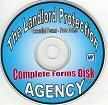
 |
 |
 |
 |
 |
Landlord Newsletter - Eviction |
|
|
The LPA Newsletter, July 2004 Dear Fellow Landlord, In this issue of The LPA Newsletter: I know you'll like it. Please e-mail us if you have any
questions or would like to add or share any material / information. Happy Independence Day! - Have a safe July. LANDLORD SPECIAL REPORT: #9 What do I do when...I have to Raise the Rent?By John NuzzoleseHave you noticed when you go to the supermarket that the prices seem to be going up? How about on your real estate tax bill? Why in the world would you not raise the rent? The subject of raising the rent is one of the most procrastinated tasks facing landlords. The reason is simple: There comes a time for every landlord when the rent has to be raised. It is not a pleasant subject from the tenantís point of view, but it must not be overlooked. You must not procrastinate it because every day it is put off, it is money out of your pocket. Food out of your childrenís mouths. Think about it at the supermarket checkout line. Every increase you donít enforce really adds up. You should have regular rent increases, even if only by small amounts. The tenant that is used to the same rent for a long period of time usually gets offended when the rent finally must increase, so it is better to make smaller gradual annual rent increases. You can address the subject of raising the rent with the tenant in a conventional or LPA Lease agreement. By having a plan for scheduled Letís say you have only three house rentals that you donít increase until you re-rent. Letís say your tenants stay an average of 3 or 4 years each. Letís also say the increase they should have gotten per year is only $25.00. WOW! Thatís $75.00 per month more for just the first year!
1st year total increase after 3 years = $2,700. Could you use a spare $5,400. about now? I know I can. Obviously, you know there are many reasons the rent needs to be increased.
I recommend using good Rent Increase Letter to notify tenants that you are raising the rent. It tells the tenants the amount of their rent increase, when the increase takes effect, and the new payment amount. It is a polite notice that reaffirms that all the terms and notice periods agreed in their lease will still continue to remain in full force. It is important to remember proper notice periods as agreed in your lease or rental agreement. Always remember that your 30 or 60 day notice period begins on the first day of your next rent period, so serve it early. Also, keep in mind that you can give notice to raise the rent whenever you want, but your lease may not allow it until it is time to put together your Notice of Lease Renewal. I also send a Tenantís Intention to Vacate Letter along with the Increase Letter in case the tenant does not agree to the proposed rent adjustment and would rather move out. Sending the Intention to Vacate letter also lets the tenant know that you are OK with the idea of them moving out. Iím often asked, "How much should we raise the rent?"
If a tenant is wonderful, we'll hold our increase down to an absolute minimum. If a tenant is bad news, the increase is likely to be much higher.
 Printer Friendly Version of this Article LANDLORD SPECIAL REPORT: #10The Landlord Protection Agency would like to thank Sherrie Bennett and Lawyers.com for supplying the article below. Evictionby Sherrie BennettA landlord may evict a tenant if the tenant:
Laws on eviction proceedings vary widely by state and are sometimes called "summary dispossess" or "unlawful detainerEviction laws are very detailed and must be followed exactly for the landlord to successfully evict. Most states have special restrictions on eviction that apply only to residential leases. These restrictions must be met very precisely before the landlord is permitted to evict a tenant. Usually, the landlord must give the tenant whatís called a ďnotice to quitĒ before starting an eviction proceeding. If the rent remains unpaid (or other problems aren't solved), and the tenant remains after the expiration of the period provided in the notice to quit, the landlord may file a lawsuit. The landlord normally cannot remove you at the expiration of the notice period. A lawsuit begins when the tenant is served with legal papers- usually a summons and complaint. A hearing is usually held within a very short time (sometimes as soon as 14 days after the summons and complaint are served). At the eviction hearing, the tenant may present any appropriate defenses, such as:
The tenant may also provide any evidence that the landlord wants to evict the tenant in retaliation for some action of the tenant, such as:
If the court rules in favor of the landlord, the tenant is usually given a short period of time to move out before the landlord can begin proceedings to forcibly eject the tenant. If the tenant doesnít voluntarily leave after the eviction lawsuit, the landlord can ask law enforcement officers to assist the landlord in completing the eviction process. The law enforcement officer will typically give the tenant official notice that police will be arriving at a certain time on a certain date to physically remove the tenant and his or her possessions from the premises. The landlord normally must not engage in any acts of self-help, such as changing the locks, removing the tenant's belongings, turning off utilities or attempting to forcibly remove the tenant. Self-help is flatly outlawed, and in most states is a crime.
 Printer Friendly Version of this Article Excuse of the Day for 6/30/04:"The window is leaking into my apartment. I can prove it. Whenever it rains hard, I get over an inch in the dixie cup I put by the window. You are going to have to do something about this before I pay another dime."This tenant leaves the window open so it can rain into her dixie cup. How smart is that. She will have to pay late fees or move. - Kathy H.Excuse of the Day for 6/22/04:"My wife said not to pay you this month. I gotta do what she says- right?"This spineless dimwit and his nightmare wife are planning to live out their security deposit, but I am beginning eviction now. The LPA Lease makes them responsible for my attorneys fees. Thank you LPA! - LPA Member Vinnie, LI, NYExcuse of the Day for 6/18/04:"I didn't get paid today. My boss is on vacation till next week and he is the only one who can straighten the situation out."MauriceExcuse of the Day for 6/12/04:"We have graduations all over the place. Don't you know how expensive these things are?"The lease does not excuse the tenant from paying rent - not even for graduation expenses. - Landlord Bob, Naples, FLQuotations...



"Here is the secret of inspiration: Tell yourself that thousands and tens of thousands of people, not very intelligent and certainly no more intelligent than the rest of us, have mastered problems as difficult as those that now baffle you.
" "True success is overcoming the fear of being unsuccessful.
" "If at first you don't succeed; you are running about average.
" "One of the secrets of life is to make stepping stones out of stumbling blocks." "Success is not a doorway, it's a staircase.
" "How much did your last tenant problem cost you?" Make money as an authorized LPA Affiliate!
How many landlords do you know? 
for New 2 -5 year LPA Members **** COMING SOON****Property Management Software
|
  
|
||||
© 2000-2024 The Landlord Protection Agency, Inc.